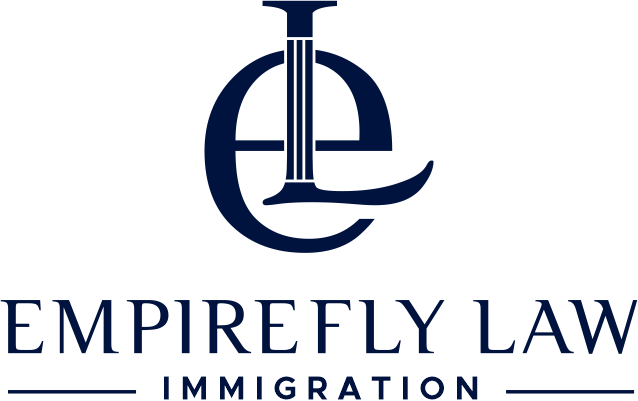Consular Processing
Our Services
U.S. Consular Processing for African Immigrants
Professional Guide to U.S. Permanent Residency through Consular Processing for African Immigrants
At Empirefly Law Firm, we are committed to helping African immigrants navigate the complexities of consular processing to obtain U.S. permanent residency. Our experienced attorneys provide personalized legal support and guidance throughout the entire consular processing journey, ensuring a smooth and successful experience.
What is Consular Processing?
Consular processing is the method by which individuals outside the United States apply for a Green Card. This process involves submitting an application to a U.S. embassy or consulate in your home country, attending an interview, and obtaining an immigrant visa, which allows you to enter the U.S. as a lawful permanent resident.
Eligibility Criteria
To be eligible for consular processing, you must qualify for a Green Card through one of the following categories:
Family-Based Green Cards:
- Immediate relatives of U.S. citizens (spouses, children under 21, and parents).
- Family members of U.S. citizens and lawful permanent residents under family preference categories.
Employment-Based Green Cards:
- Individuals with a job offer from a U.S. employer under categories such as EB-1 (priority workers), EB-2 (professionals with advanced degrees), and EB-3 (skilled workers).
Diversity Visa Lottery:
- Individuals from countries with low rates of immigration to the U.S. who are selected through an annual lottery.
Humanitarian Programs:
- Refugees and asylees, as well as individuals under special programs like the Violence Against Women Act (VAWA), Special Immigrant Juveniles (SIJ), and U visas for crime victims.
Other Categories:
- Investors under the EB-5 Immigrant Investor Program and other special immigrant categories.
Consular Processing Steps
Petition Filing:
- File the appropriate petition with U.S. Citizenship and Immigration Services (USCIS) (Form I-130 for family-based or Form I-140 for employment-based applicants).
- Once USCIS approves your petition, it will be forwarded to the National Visa Center (NVC) for further processing.
Visa Application:
- The NVC will send you instructions for completing Form DS-260, Online Immigrant Visa and Alien Registration Application.
- Submit the form along with the required fees and supporting documents.
Prepare for the Interview:
- Attend a medical examination with an authorized physician.
- Collect and prepare all necessary documents, including your passport, birth certificate, and evidence of financial support.
Attend the Interview:
- Attend your scheduled interview at the U.S. embassy or consulate in your home country.
- A consular officer will review your application and ask questions to verify your eligibility.
Receive Decision:
- If approved, you will receive an immigrant visa allowing you to travel to the U.S.
- Upon entering the U.S., you will be admitted as a lawful permanent resident and will receive your Green Card by mail.
Why Choose Empirefly Law Firm?
Expert Legal Guidance:
- Our attorneys have extensive experience in consular processing and U.S. immigration law, providing personalized advice tailored to your unique situation.
Comprehensive Support:
- We offer support at every step of the consular processing journey, from petition filing to interview preparation and receiving your immigrant visa.
Proven Success:
- Our firm has a strong track record of successfully helping African immigrants navigate consular processing and achieve permanent residency.
Client-Centered Approach:
- We are committed to making the consular processing experience as stress-free as possible, offering compassionate and reliable support throughout your journey to U.S. permanent residency.
Take Visa Eligibility Assessment
Ready to start your consular processing journey? Take the Visa Eligibility Assessment. Our experienced attorneys are here to guide you through the consular processing steps and help you achieve your dream of living and working permanently in the United States.
GET TO KNOW IF YOU ARE ELIGIBLE
Start Your Visa Eligibility Assessment Today
Find out if you qualify for a U.S. visa with our quick and easy online assessment. Begin your journey today!
FAQS
Answers to Your Common Questions
For more personalized guidance and assistance with your family immigration needs, take the Empirefly Eligibility Assessment
You can sponsor your spouse, children, parents, and siblings for a green card. Immediate relatives, such as spouses, unmarried children under 21, and parents of U.S. citizens, have priority and typically face shorter wait times. Extended family members fall under family preference categories and may experience longer processing times due to annual visa caps.
The processing time for a family-based green card varies depending on the relationship between the petitioner and the beneficiary. Immediate relatives can expect processing times ranging from 12 to 18 months. Family preference categories can take several years, depending on visa availability and the applicant's home country.
To sponsor a family member, you must be a U.S. citizen or a lawful permanent resident (green card holder). You must also demonstrate sufficient income to support your family member(s) by submitting an Affidavit of Support (Form I-864). Additionally, the sponsored family member must meet all eligibility requirements, including passing medical and background checks.
Yes, you can sponsor your fiancé(e) for a K-1 visa, which allows them to enter the U.S. to get married within 90 days. After the marriage, they can apply for adjustment of status to become a lawful permanent resident. The K-1 visa process includes submitting a Petition for Alien Fiancé(e) (Form I-129F) and meeting specific eligibility requirements.
If your family member's visa application is denied, it's crucial to understand the reason for the denial, which will be outlined in the decision notice. Depending on the circumstances, you may be able to address the issues and reapply, file an appeal, or submit a motion to reopen or reconsider the case. Consulting with an experienced immigration attorney can help determine the best course of action.
You can check the status of your family member's visa or green card application online through the U.S. Citizenship and Immigration Services (USCIS) website using the receipt number provided when the application was filed. For consular processing, you can check the status on the U.S. Department of State's Consular Electronic Application Center (CEAC) website.
